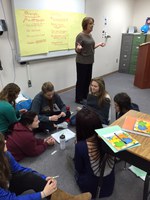NDSU Extension Helps Communities Take Charge of Their Future
(Click the image below to view a high-resolution image that can be downloaded)
Rural North Dakota communities often struggle to strengthen their economy.
To assist them, the North Dakota State University Extension Service partnered with the U.S. Department of Agriculture’s Rural Development program on the Stronger Economies Together (SET) program. Through SET, communities work collaboratively on an economic development plan that builds on the region’s current and emerging economic strengths.
Community and business leaders in Logan, McIntosh and Emmons counties were the first to take advantage of SET. Their goals were to increase tourism, improve access to local foods and health care, and get more youth involved in leadership roles.
“We have been working and looking for something to come along in order to help jump start and bring out the talent and vitality of individuals in our community, and we believe the SET program can certainly aid us in that process,” says Don Kosel, economic developer for Ashley.
To date, the communities have:
- Strengthened communication and partnerships among health-care administrations
- Raised more than $60,000 in scholarships for students who will return to the region in a health-related career
- Initiated conversations about local foods and laid the groundwork for federal-level changes to benefit entrepreneurs
- Encouraged youth to participate in community planning and trained them to be effective board, council or committee members
- Created a unified tourism vision for the region
“The SET civic forum went much better than I expected,” says Angie Benz, former Hazelton city auditor. “The group was so engaged and everyone contributed to the process. I can’t remember ever having so many people from across the region in one room to work together for a common cause.”
SET is one of several ways NDSU Extension helps create vital communities. Extension provides the research-based information and connections to experts and resources that allow communities to make informed decisions and build on opportunities to meet citizens’ needs now and in the future. Here are some other Extension programs focusing on helping communities.
Community Impressions
Those who have lived in a community awhile probably don’t need a sign directing them to the hospital or library, and they no longer notice an empty lot filled with trash and tall weeds. Community Impressions helps communities learn about their strengths and weaknesses through the eyes of first-time visitors.
Bowman and Carrington piloted the program in North Dakota. A group of volunteers from each city made unannounced visits to the other’s community. The volunteers drove through the community to gather their first impressions, then ate at a restaurant, chatted with residents, and checked out businesses, and housing, tourism and recreational opportunities. Later, they reported their findings to the community’s residents and leaders.
“It was very eye-opening in a lot of ways,” says Andrea Bowman of Bowman. “You’ll never look at a small community the same way again.”
Laurie Dietz, executive director of the Carrington Area Chamber of Commerce, agrees the program was worthwhile.
“We have taken the information given to us from the Bowman group and really ran with it,” she says. “We have utilized several ideas that we saw in their community.”
Burlington and Washburn groups will exchange visits later this year.
Another program, Marketing Hometown America, helps residents learn what assets their community has and what people are looking for when they relocate to another community.
Inspiring Leaders
Inspiring Legendary Leaders was a one-day leadership workshop NDSU Extension hosted in April in Bismarck. Local, state and national speakers shared their expertise and motivated participants to enhance their personal and community leadership skills so they can turn their community into a better place to live.
Extension also offers leadership training for youth and adults. Youth Lead Local is a one-day program that helps high school juniors and seniors understand effective meeting management, parliamentary procedure and how to turn an idea into reality.
“The Youth Lead Local event has energized our Student Council,” says Michael Schirado, high school principal and Student Council adviser in Linton. “We are now brainstorming for ideas that not only will improve our school but also make an impact beyond our walls.”
The adult version, Lead Local, prepares aspiring, elected and appointed officials to serve on boards, councils and committees.
“Because of Lead Local, I feel I can more effectively run and be a part of board meetings on all levels,” says Carie Moore, a member of the Towner County Soil Conservation District and North Dakota/Towner Farm Bureau boards. “I am now even more prepared to move up from local and county boards to state boards and engage effectively and make a greater impact.”
Assistance to Organizations
Employees often make the first impression on customers and visitors in rural communities and businesses. In Extension’s Welcome to Our Town program, participants learn about the amenities, services and activities their community has to offer and techniques for providing better customer service.
Visit www.ag.ndsu.edu/ccv for more information about NDSU Extension’s community vitality efforts.
NDSU Agriculture Communication - April 19, 2017
| Source: | Lynette Flage, 701-231-7782, lynette.flage@ndsu.edu |
|---|---|
| Editor: | Ellen Crawford, 701-231-5391, ellen.crawford@ndsu.edu |


